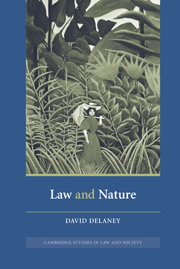Book contents
- Frontmatter
- Contents
- Acknowledgments
- Part I Situating nature
- 1 Introduction: the pragmatics of nature and the situation of law
- 2 The nature of modern political discourse: doing things with nature
- 3 The natures of scientific discourse
- 4 The natures of legal discourse
- 5 The natures of legal practice
- Part II Rendering nature
- Part III Judging nature
- References
- Index
3 - The natures of scientific discourse
Published online by Cambridge University Press: 22 July 2009
- Frontmatter
- Contents
- Acknowledgments
- Part I Situating nature
- 1 Introduction: the pragmatics of nature and the situation of law
- 2 The nature of modern political discourse: doing things with nature
- 3 The natures of scientific discourse
- 4 The natures of legal discourse
- 5 The natures of legal practice
- Part II Rendering nature
- Part III Judging nature
- References
- Index
Summary
INTRODUCTION
The cluster of concepts centered on “nature,” then, is an extremely versatile cultural artifact. Though my main concern is what it may be used to accomplish in political or moral argument, we all use it, or parts of it, in innumerable contexts. There are some cultural domains, however, within which nature talk and understandings of what it means to know and control nature are not merely occasional or tacit but constitutive of the domain and its associated practices. Among these are science and its ancillary domains including technology and medicine. Because of the pervasive cultural authority of these practices and because much of law's dealings with nature are mediated by scientific framings of nature, it is important to look more closely, if still quite schematically, at the practice – and politics – of science.
In this chapter I briefly examine the politics of science as an important component of the contemporary politics of nature. If science is a source of culturally significant representations of nature, a large part of their significance – and their legitimacy and authority – derives from the conditions of their production. To the extent that the practice of natural science is commonly understood as being insulated from political ideology or economic interest, its products, “facts of nature,” may be received as objective, value-neutral representations. As such they are extremely valuable resources for making sense of states of affairs.
- Type
- Chapter
- Information
- Law and Nature , pp. 54 - 76Publisher: Cambridge University PressPrint publication year: 2003



